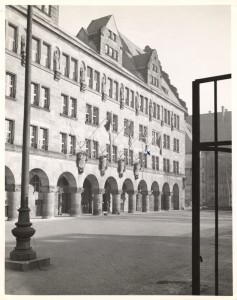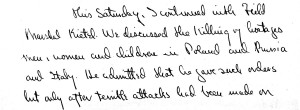The growing staff of the International Military Tribunal was preparing to prosecute individuals held responsible for some of the most horrific, gruesome, and bloodcurdling actions during WWII. The environment of the court was becoming increasingly intense and professional with the lives of many on trial for those actions. Many of the military men, as well as those investigating and working for the prosecution teams, took the time to create or balance the daily exposure to chilling facts of the Nazi regime with more pleasant activities during their time in Germany.
Dinner parties, traveling, or attending performances at the opera house became regular occurrences as the staff settled in and became better acquainted with one another. On 15 September 1945, Colonel Amen held a cocktail party for himself and ten others including Jackson, the man who selected Dodd for the U.S. team. The event included a private dinner party at the hotel. Dodd informed his wife, “It is quite informal and it does make life in this atmosphere at least bearable” [p. 129, 9/15/45]. Four days later on the 19th of September, Colonel Corley hosted a dinner party of his own at the Herr von Faber Castle, which was designed with a marvelous 80 rooms, and contained a prominent orchestra welcoming the guests as they entered the majestic Castle. Continue reading



